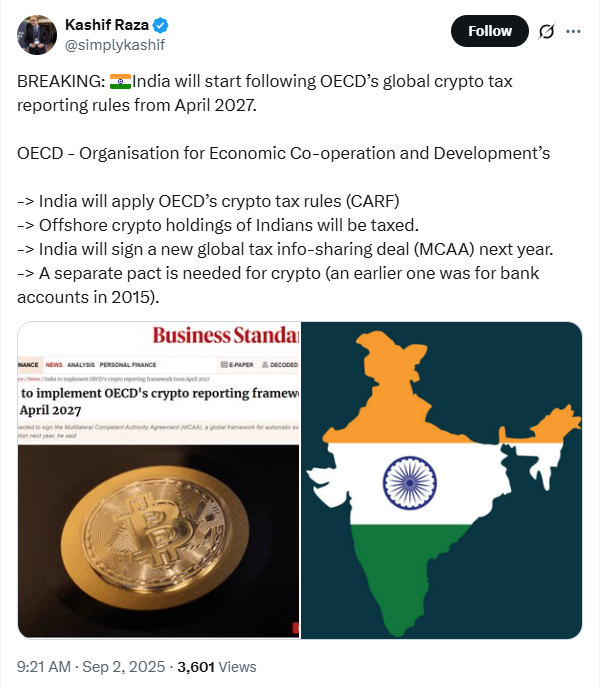OECD Crypto Taxation and CARF to Reshape India’s Global Tax Approach
Why in news
India is set to follow OECD Crypto taxation rules from April 2027 under the OECD-G20 BEPS framework, it will make sure that multinational enterprises (MNEs) and nation residents pay their fair share.
With the CARF India regulations, international digital asset holdings will now be taxed and a new global tax info-sharing deal (MCAA) is coming next year. According to a recent report of Business standard .
This separate pact for cryptocurrency strengthens country’s stance on decentralized levy, going beyond earlier agreements like the 2015 bank account treaty. The global digital asset tax era is finally here!
India’s Stand on Global Tax Reforms
Founder of Bitinning, Kashif Raza shared his views on Organisation for Economic Co-operation and Development’s, a new global tax info-sharing deal (MCAA) will be signed in 2026, replacing earlier bank-focused agreements with decentralized-specific rules.

Source: X
The levy charged at 6% on payments exceeding ₹1 lakh annually to offshore service providers, targeted companies like Google, Amazon and Facebook. These firms had significant client bases in India but routed their transactions through offshore units and escaped local taxations.
Significance of OECD Crypto taxation in India
The country has made it clear that under the OECD Crypto taxation system, it must not lose revenue compared to what it currently earns through the levy. The country also advocates for:
-
A wider application of the global tax rules for fair revenue allocation.
-
A consensus-based solution that is simple to implement and comply with.
-
Greater profit allocation to market jurisdictions, particularly developing economies.
This aligns with country’s long-standing position that demand-side factors should play a role in profit allocation.
Decentralized system Gains Clarity Under OECD’s CARF
The digital-Asset Reporting Framework (CARF) introduces a standardized system for reporting decentralized transactions, offering clarity to the digital asset industry.
International decentralized holdings of Indian residents will now be taxed and India will sign the Multilateral Competent Authority Agreement (MCAA) next year to enable global tax information sharing.
CARF is expected to:
-
Enhance transparency and investor trust through consistent reporting.
-
Encourage global adoption of crypto rules as more countries join the MCAA.
-
Reduce long-term compliance burdens by providing a single framework for businesses operating across jurisdictions.
Blockchain Innovation and Wider Benefits
Beyond taxation, the OECD Crypto taxation also works on blockchain and explores areas like remittances and tokenized assets and potentially leading to more efficient and inclusive financial systems.
By considering new technologies such as Central Bank Digital Currencies (CBDCs) within reporting frameworks. The OECD ensures that digital currencies also contribute to fiscal responsibility and transparency.
Conclusion
India’s adoption of OECD Crypto taxation rules and CARF for decentralized currency, represents a transformative moment in worldwide taxations and digital finance.
It balances fair taxation of multinational corporations with a predictable regulatory framework for crypto that is positioning India as a stronger player in the worldwide financial ecosystem.
免责声明:本文章仅代表作者个人观点,不代表本平台的立场和观点。本文章仅供信息分享,不构成对任何人的任何投资建议。用户与作者之间的任何争议,与本平台无关。如网页中刊载的文章或图片涉及侵权,请提供相关的权利证明和身份证明发送邮件到support@aicoin.com,本平台相关工作人员将会进行核查。




